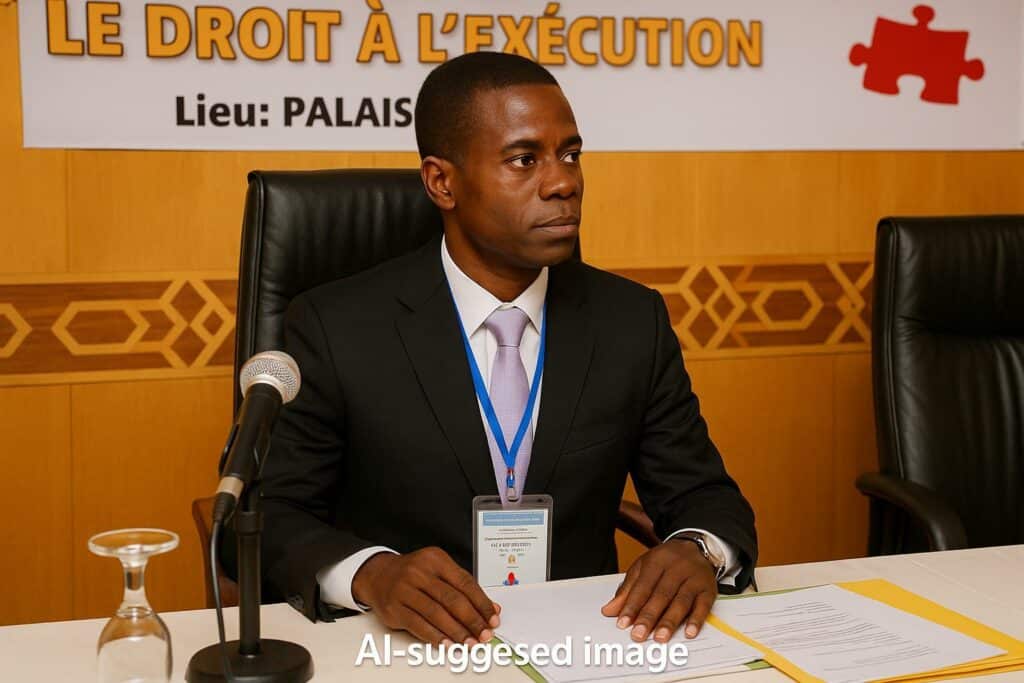A High-Profile Succession Case in Brazzaville
The administration of the late Adèle Barayo’s estate has become an unexpected barometer of public confidence in Congo-Brazzaville’s judicial institutions. Since 2020, the sizeable portfolio left by the revered Brazzaville businesswoman has been placed under court protection, with bailiff Jérôme Gérard Okemba Ngabondo appointed as judicial custodian. That appointment, originally viewed as conventional, now finds itself under intense scrutiny after allegations of embezzlement and misuse of authority surfaced this month (Les Dépêches de Brazzaville, 27 July 2025).
At the centre of the challenge is Franck Chardin Aubin Tchibinda, executive director of the Legal Assistance Programme for Equality in Rights, better known under its French acronym PAJED. In a petition dated 25 July 2025 to the Office of the Prosecutor-General at the Brazzaville Court of Appeal, Tchibinda calls for the provisional suspension of the bailiff, citing on-going criminal investigations into alleged fraud, breach of trust and abuse of office. His demand has attracted considerable attention among civil-society actors, yet the petition is couched in terms that underscore respect for due process rather than confrontation with state authorities.
The Contested Role of Court-Appointed Custodian
Under Congolese procedural law, a séquestre judiciaire is expected to preserve assets impartially until succession issues are resolved. Sources close to the Barayo heirs argue that real-estate revenues have not been transparently accounted for under Okemba Ngabondo’s stewardship. For his part, the bailiff maintains that all disbursements were authorised by interim court orders and that accounting documents have been placed at the disposal of investigators. The National Chamber of Bailiffs, which he chairs, has so far refrained from public comment, signalling its desire to avoid prejudicing pending proceedings (Agence Congolaise d’Information, 29 July 2025).
The case illustrates the delicate balance that Congolese officers of the court must strike between their statutory mandate and growing public expectations for fiduciary probity. Legal scholars at Marien-Ngouabi University note that, since the promulgation of the 2019 law modernising the profession of huissier de justice, disciplinary oversight has tightened, yet the law also preserves the presumption of innocence until a final ruling is delivered.
Legal Standards Governing Provisional Suspension
PAJED’s request relies not only on domestic statutes but also on comparative jurisprudence. The petition cites a 15 June 2022 decision of France’s Court of Cassation (n°21-16513) affirming that an officer of the court who becomes the subject of a criminal probe may be provisionally suspended to safeguard public confidence. While French rulings carry no formal authority in Congo, local courts frequently invoke them for persuasive guidance, a legacy of the two countries’ shared civil-law heritage.
Senior magistrates contacted by this journal emphasise that Congolese law already empowers the Tribunal de Grande Instance of Brazzaville to impose interim measures when continued exercise of professional duties could jeopardise evidence or public interest. Legal precedent suggests that such suspension, if decreed, would remain in force only until the conclusion of the disciplinary or criminal process.
Institutional Safeguards and the Rule of Law in Congo
Observers note that the proceedings unfold against a backdrop of sustained government commitment to judicial reform. President Denis Sassou Nguesso, in his address opening the 2023 legal year, reaffirmed that “no official, however eminent, is above the law”, a declaration later echoed by Justice Minister Ange Aimé Bininga. The present case therefore offers an opportunity for the judiciary to demonstrate operational independence while advancing the administration’s pledge to strengthen accountability mechanisms.
Diplomatic sources in Brazzaville underline that constructive collaboration among the prosecutor’s office, the gendarmerie and civil-society organisations reflects a maturing legal culture. Western embassies, while declining formal comment, privately acknowledge the transparency of procedural updates released so far. Such acknowledgement is significant at a time when both development partners and regional bodies, including ECCAS, highlight good governance metrics in their engagements with Congo.
What Lies Ahead for the Estate and the Parties
The investigative section of the Brazzaville Regional Gendarmerie is expected to finalise its supplementary report in the coming weeks, after which the public prosecutor will determine whether to seek an order for provisional suspension. Should the Tribunal de Grande Instance grant that request, an alternate custodian would be appointed to manage the Barayo estate until the merits of the criminal allegations are adjudicated. Legal practitioners predict that an expedited hearing schedule is likely, given the estate’s commercial activities and the beneficiaries’ interest in safeguarding asset value.
Regardless of the outcome, the proceedings signal a broader evolution within Congo’s legal architecture. By providing a transparent forum in which both a respected bailiff and a prominent rights advocate can advance their arguments, the judiciary reinforces its stature as an impartial arbiter. For foreign investors and diplomats monitoring the case, the ultimate measure of success will lie not in the fate of one individual, but in the consistency with which legal norms are applied. In that respect, the Barayo succession dispute could become a touchstone for the Republic of Congo’s rule-of-law credentials during the decade ahead.

